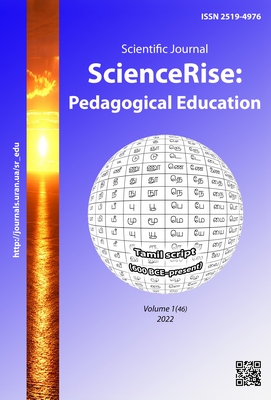Experience of teaching of propadeutic pediatrics to english-speaking students under quarantine limitations
DOI:
https://doi.org/10.15587/2519-4984.2022.253353Keywords:
distance learning, classroom learning, questionnaire, students, English language learning, propaedeutics of pediatricsAbstract
The research is devoted to the issues of improving the educational content in the clinical discipline propaedeutics of pediatrics for English-speaking foreign students in COVID-19 epidemic conditions. Based on the peculiarities of the organization of the educational process in the conditions of quarantine restrictions, adjustments were made to the methodology of teaching the discipline. All methodological materials were adapted to the conditions of distance education, supplemented by educational videos, illustrative photo and diagrams and were posted on the website of the department and on the educational portal Moodle, so students had the opportunity to apply to them again at any time. Student feedback has been carefully established. By conducting an anonymous questionnaire, we studied the point of view of students as to the study in a mixed distance-classroom system. According to the survey, among 147 surveyed students, 87.1 % rated the quality of education on a five-point scale at "5" or "4", 12.9 % – at "3". The most frequently interviewed students suggested increasing the number of references to illustrative materials in the guidelines, making extensive use of video, photo, models during practical classes and expressed a desire to work with sick children in the clinic to better master the method of examination. Problems of organization of educational process can be connected with technical maintenance of Internet communication both on clinical bases of department, and in places of residence of students, computer literacy of teachers and students, sufficient availability of necessary models and phantoms at the department, medical and security regime in hospital wards. Also, ways to improve teaching are careful methodological and technical support of lectures and practical classes, active use of innovative technologies
References
- The COVID-19 outbreak is also a major education crisis (2020). UNESCO. Available at: https://en.unesco.org/covid19/educationresponse/globalcoalition
- Pro zatverdzhennia Polozhennia pro dystantsiine navchannia. Nakaz Ministerstva osvity i nauky Ukrainy No. 466. 25.04.2013. Available at: https://zakon.rada.gov.ua/laws/show/z0703-13#Text
- Burki, T. K. (2020). COVID-19: consequences for higher education. The Lancet Oncology, 21 (6), 758. doi: http://doi.org/10.1016/s1470-2045(20)30287-4
- Romanovskyi, O. H., Kvasnyk, O. V., Moroz, V. M., Pidbutska, N. V., Reznik, S. M., Cherkashyn, A. I., Shapolova, V. V. (2019). Development factors and directions for improving distance learning in the higher education system of Ukraine. Informatsiini tekhnolohii i zasoby navchannia, 74 (6), 20–42.
- Krytska, H. A., Krytskyi, I. O., Zahrychuk, H. Ya., Krytskyi, T. I. (2017). Prospects and difficulties of the effective innovative technologies use for providing medical students professional training during clinical disciplines study. Medical Education, 74 (2), 33–36. doi: http://doi.org/10.11603/me.2414-5998.2017.2.7826
- Reimers, M., Schleicher, A., Saavedra, J., Tuominen, S. (2020). Supporting the continuation of teaching and learning during the COVID-19 Pandemic. Global Education Innovation Initiative at the Harvard Graduate School of Education. OECD, 37. Available at: https://www.oecd.org/education/Supporting-the-continuation-of-teaching-and-learning-during-the-COVID-19-pandemic.pdf
- Kukharenko, V. M. (2018). Pereshkody vprovadzhenniu dystantsiinoho navchannia. Dystantsiina osvita: realii ta perspektyvy. Kharkiv: KhNPU im. H. S. Skovorody, 35–38.
- Zhai, Y., Du, X. (2020). Loss and grief amidst COVID-19: A path to adaptation and resilience. Brain, Behavior, and Immunity, 87, 80–81. doi: http://doi.org/10.1016/j.bbi.2020.04.053
- Barrable, A., Papadatou-Pastou, M., Tzotzoli, P. (2018). Supporting mental health, wellbeing and study skills in Higher Education: an online intervention system. International Journal of Mental Health Systems, 12 (1). doi: http://doi.org/10.1186/s13033-018-0233-z
- Vlachopoulos, D., Makri, A. (2019). Online communication and interaction in distance higher education: A framework study of good practice. International Review of Education, 65 (4), 605–632. doi: http://doi.org/10.1007/s11159-019-09792-3
- Marques da Silva, B. (2020). Will Virtual Teaching Continue After the COVID-19 Pandemic? Acta Médica Portuguesa, 33 (6), 446. doi: http://doi.org/10.20344/amp.13970
- Yaroshevskaya, T. (2020). Modern peculiarities of lectures in clinic discipline for english-speaking students. ScienceRise: Pedagogical Education, 2 (35), 37–41. doi: http://doi.org/10.15587/2519-4984.2020.199114
Downloads
Published
How to Cite
Issue
Section
License
Copyright (c) 2022 Tetiana Yaroshevska

This work is licensed under a Creative Commons Attribution 4.0 International License.
Our journal abides by the Creative Commons CC BY copyright rights and permissions for open access journals.
Authors, who are published in this journal, agree to the following conditions:
1. The authors reserve the right to authorship of the work and pass the first publication right of this work to the journal under the terms of a Creative Commons CC BY, which allows others to freely distribute the published research with the obligatory reference to the authors of the original work and the first publication of the work in this journal.
2. The authors have the right to conclude separate supplement agreements that relate to non-exclusive work distribution in the form in which it has been published by the journal (for example, to upload the work to the online storage of the journal or publish it as part of a monograph), provided that the reference to the first publication of the work in this journal is included.








